Cursorily discussed in this post: 12 books (Going Sane; Essays in Love; Hallucinations; The Accursed Share; The Golden Notebook; Atmospheric Disturbances; Trust; Everything is Waiting For You; Violet Bent Backwards Over Grass; The Junta of Happenstance; Your Emergency Contact Has Experienced an Emergency; and Night Lunch); 1 movie (Pinocchio); and 1 documentary (Encounters).
BOOKS
1. Phillips, Adam. Going Sane (2005).
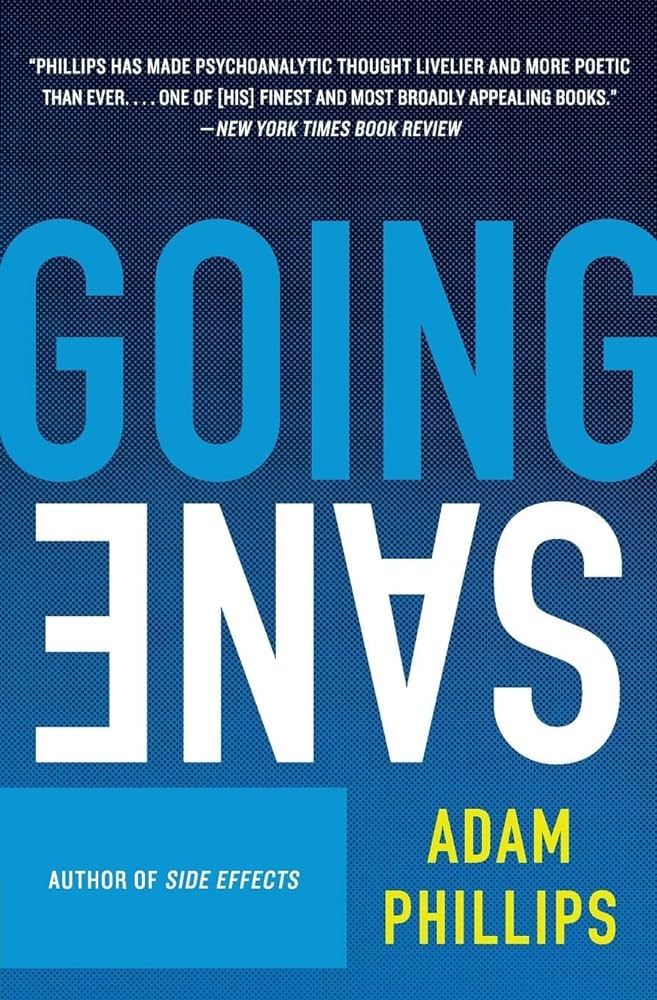
Alas, my car in the shop, I was on the final pages of this book… but after catching an early morning bus to another city, I my mixture of fatigue and enthusiasm to see my brother, I must have left the book somewhere on the bus or at the stop. Which means this review will also be even more inadequate than usual. I read Going Sane quickly with that mixture of pleasure and frustration that has become familiar to me after reading a couple of Adam Phillips’ books in a row. Wonderfully fun and creative thinking. Incisive and playful questions—the best kind of playfulness, the kind that inspires the reader to also read playfully and creatively—but then the repetitions, the too much Shakespeare for someone who isn’t British, and the unconcluded trains of thought kick in. Mostly, though, for a book that purported to be about sanity, in a market flooded with works on madness, I found that Phillips still had a lot to say about madness and very little to say about what it might mean to be or go sane. Fun but not quite what I hoped it would be.
2. De Botton, Alain. Essays in Love (2008).
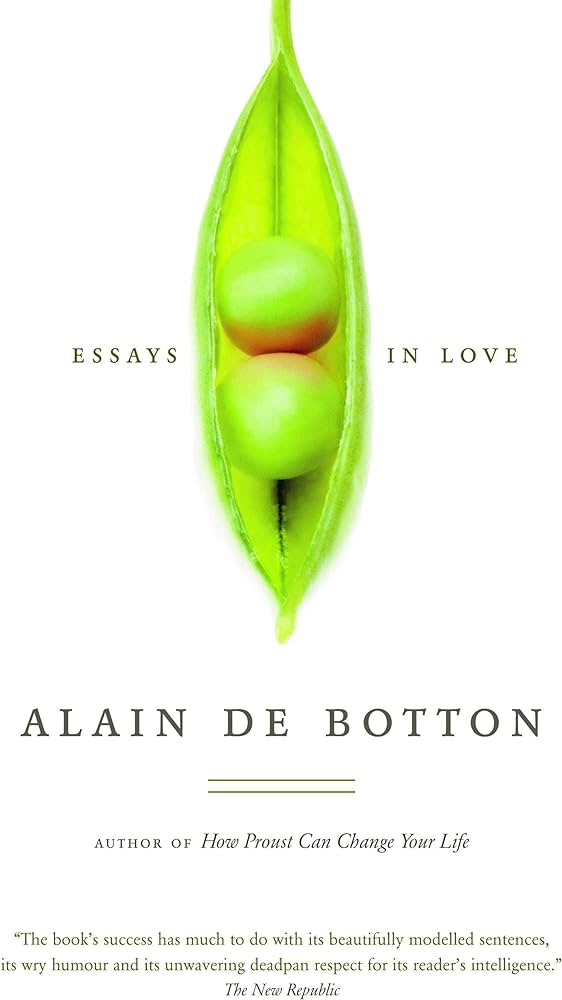
Alain De Botton likes all the snobby things that snobby people like. He writes books about them. He doesn’t openly gloat—good snobbery is always a little more subtle and humourous than low-brow gloating—and he’s wealthy enough that he doesn’t have to be pathologically invested in his snobbery in order to compensate for other forms of status anxiety (and he’s snobby enough that he doesn’t have to be pathologically invested in his wealth), so he’s fun to read. He references Proust and Aristotle but he’s charmant. His Essays in Love is an autobiographical reflection on a relationship he had with a woman who enamoured him, lived with him, and ultimately left him (before the process of being in love began anew with someone else). It’s cultured but not dense. Of course there’s tragedy but there’s also hope and through it all the belief in romance never wanes. In other words, this is not Julia Kristeva’s Tales of Love. It’s a tasty treat for those who like to think they have a refined palate.
3. Sacks, Oliver. Hallucinations (2012).
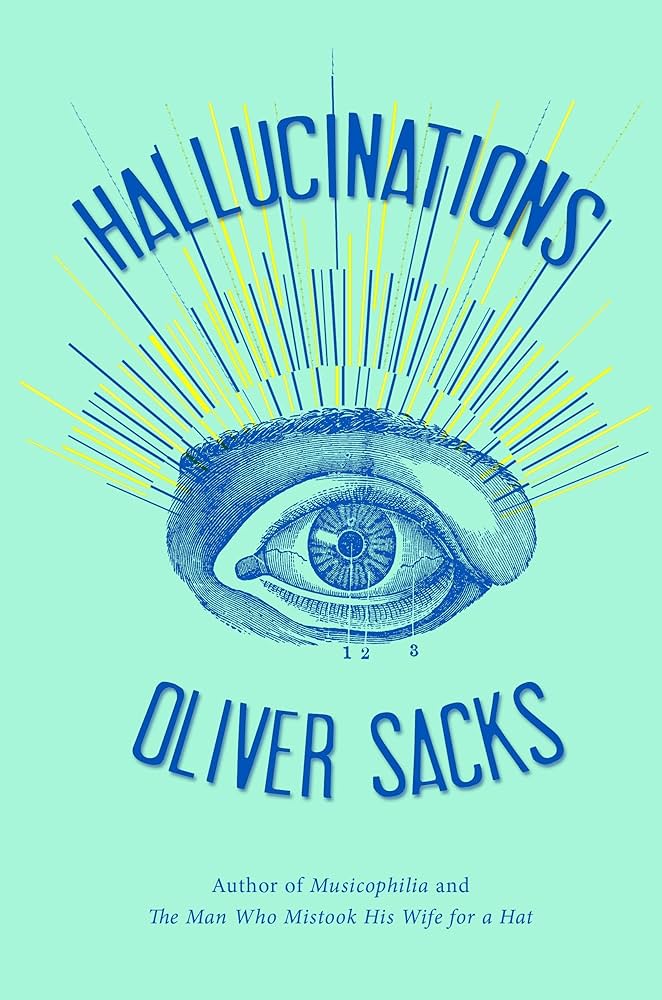
Oliver Sacks is a neurologist who has written a number of popular science books about the brain, how strange things can happen when some brains start acting differently than others, and what the presence of those anomalies makes us think about what we regard as normal, natural, or real. He never goes into great depth (either with the science or the philosophical reflections) but he is mildly amusing. I was drawn to this book in particular because I have been thinking a lot about hallucinations (both those caused by psychosis and those caused by psychedelic plants or fungi—as well as the idea of “negative hallucinations,” which would be not seeing something that is there for others, rather than seeing something that isn’t there for others). It was… okay. Nothing ground-breaking or overall creative. Mostly lists of fun facts and anecdotes. If you enjoy this sort of thing, then you will enjoy it. If you prefer something a little more substantial, I say give it a pass and Antonio Damasio, Iaian McGilchrist, or Mark Solms.
4. Bataille, Georges. The Accursed Shared: An Essay in General Economy. Volume 1: Consumption (1989).
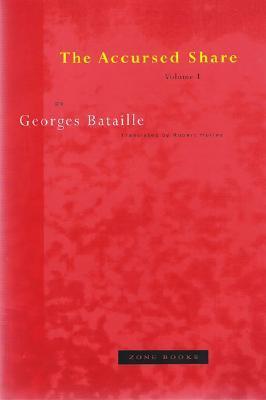
Despite my curiosity about French theory, I never got into Georges Bataille. What I read about his work didn’t make me feel like actually reading his work. However, I stumbled on this book and since it was about economics, I was curious to see what his take was on this subject matter. It turns out his take is mostly boring, derivative, distracted, and superficial. This is the kind of book that gets published strictly because the publisher knows people will buy books by Bataille. And Bataille is the kind of scholar, it seems, who thinks he can write a book on anything at all because he is Bataille. However, if anyone but a big name had written this book, I doubt anyone would read it. Not recommended.
5. Lessing, Doris. The Golden Notebook (1962).
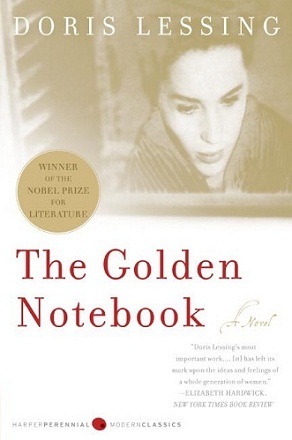
This book has been on my to-read list for years. Often considered one of the greatest novels of the twentieth-century, I’ve been a bit daunted by its size (been reading a lot of short stories these days as I transition more and more away from just reading really-long-books). However, I’m very glad I read it. It’s insightful, complex, extraordinarily well-written, problematical, and kind of reminds me of real people living real lives in ways that I don’t always like but in ways that make me pay attention. Lessing is a complicated character and much of herself—and her complexities—are in this novel. Strong feminist positions are espoused, as well as very sincere rhetoric devoted to racial equality (even if the actual practices that accompany that rhetoric end up affirming White supremacy in different and not always expected ways), but these are coupled with praise for toxic forms of masculinity and homoantagonism. The novel, apart from never once making me feel bored over the span of almost seven hundred pages, is a case study for what we talk about when we talk about intersectionality! Recommended reading (which is not to say I approve of all of the content but which is to say I enjoyed the book and appreciated the way it compelled me to engage it critically).
6. Galchen, Rivka. Atmospheric Disturbances (2008).
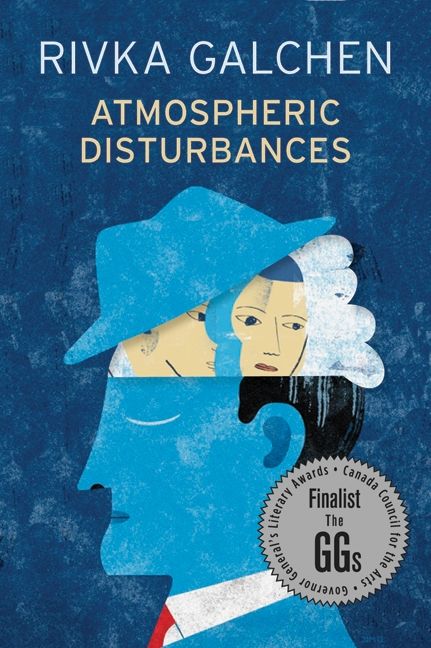
Rivka Galchen is one of my favourite novelists I discovered this year. I liked her short story collection, American Innovations, very much and also enjoyed her latest, and highly praised, novel, Everyone Knows Your Mother Is a Witch (it’s a clever take on a fun and little known historical fact—Katharina Kepler, the mother of the brilliant German astronomer Johannes Kepler, was accused of being a witch). Atmospheric Disturbances is Galchen’s first novel and it’s also very well done. It’s a psychological thriller tinged with elements of the noir and absurdist comedy. Her technical proficiency as a creative and clever storyteller is on full display. An enjoyable read although I find myself preferring the affect she creates with her short stories.
7. Diaz, Hernan. Trust (2022).

Hernan Diaz won a Pulitzer for Trust. It reminded me of an economic take on Bolaño’s detective novels. Only, in this instance, the writing isn’t nearly as good (it’s not intended to be since three of the four sections of the novel are written by protagonists who are not writers), the detective is you the reader, and the climax, if you can call it that, might leave you feel like it wasn’t worth the effort to get there.
8. Whyte, David. Everything is Waiting for You (2003).
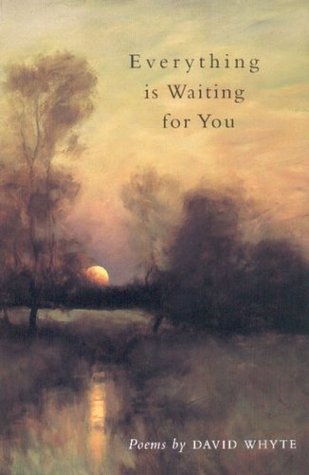
When I pick on bougie White poets who talk about connecting with nature from multi-million-dollar cottages or in National Parks that were forcibly cleared of Indigenous peoples who were there long before Europeans ever were, David Whyte is one of the poets I have in the back of my mind. But, perhaps, I am a little unfair to him. Because a lot of his poetry really is affective and moving and written in the understated way that I appreciate. Perhaps I’m jealous. I wish that I could write about nature from a multi-million-dollar cottage on an island with old growth forests and an American military base! I wish that I had parents whose deaths I would mourn the way that David Whyte mourns his parent in this book. This is a strong collection. Recommended reading.
9. Del Rey, Lana. Violet Bent Backwards Over the Grass (2020).
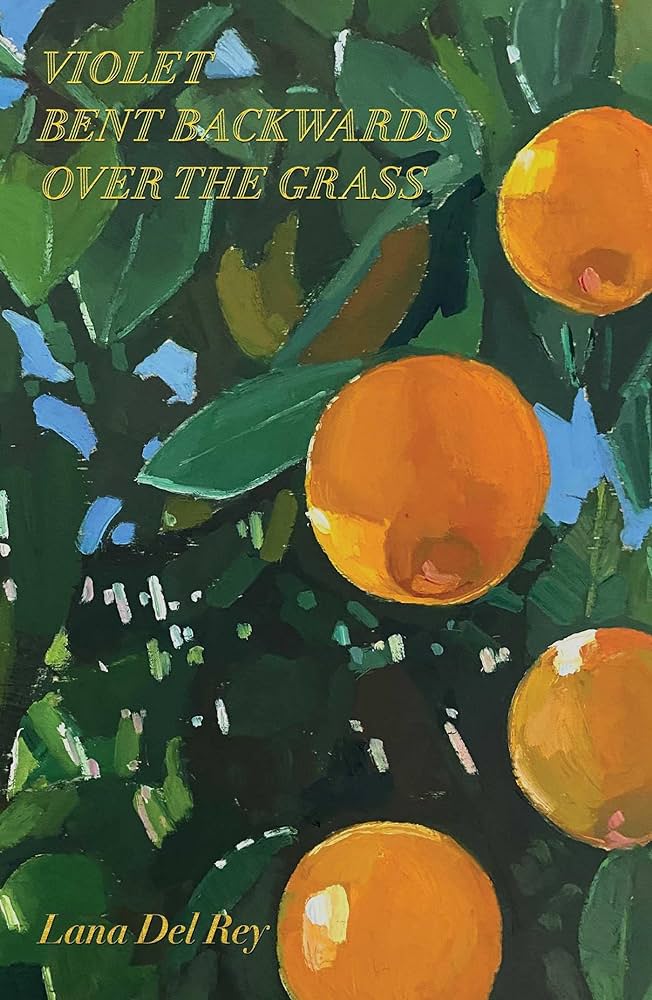
Lana Del Rey is a problematical artist I enjoy for problematical reasons. I didn’t know she had published a book of poems until I found it at the thrift store. The photos included are nice for the mood they create, but it didn’t feel too different than reading the lyrics to her songs online (with no music included). I’m sure this will appeal to her fans. Not sure it will appeal to anyone else.
10. Oloruntoba, Tolu. The Junta of Happenstance (2020).
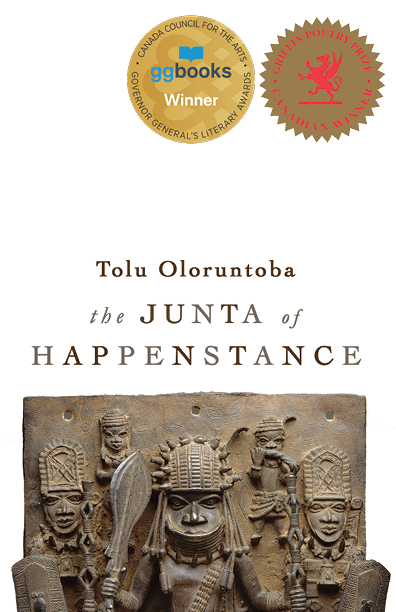
Some poets really like using rare words. I assume they think deeply about those rare words and feel like they express what they feel so much better than non-rare words. Still, when you string ‘em all together, it feels more like you need a pass to be included in an elite club. Personally, I’m of the opinion that we don’t spend enough time thinking about and diving into the depths of our non-rare words. Anyway, if you like rare-word poems, like the critics do, you’ll like the critically-acclaimed work of Tolu Oloruntoba.
11. Chen, Chen. Your Emergency Contact Has Experienced an Emergency (2022).

Chen Chen is one of my all-time favourite poets. I enjoyed his 2017 collection, When I Grow Up I Want to Be a List of Further Possibilities, and I loooooved Your Emergency Contact Has Experienced an Emergency. He’s clever, tender-hearted, deeply aware of structural violence and how oppression operates in day to day lives and in our most intimate relationships, and he is also genuinely funny. Funny in a way that makes me laugh out loud shake my head and say, “Oh snap!” Chen is able to hold together the most profane things (eating ass, for example) with the most sacred things (to love without being afraid, for example) and it’s a beautiful weaving that makes me gasp and rejoice and want to deep French kiss my partner. Super highly recommended. This will be one of my best books of the year.
12. Chaulk, Mike. Night Lunch (2020).
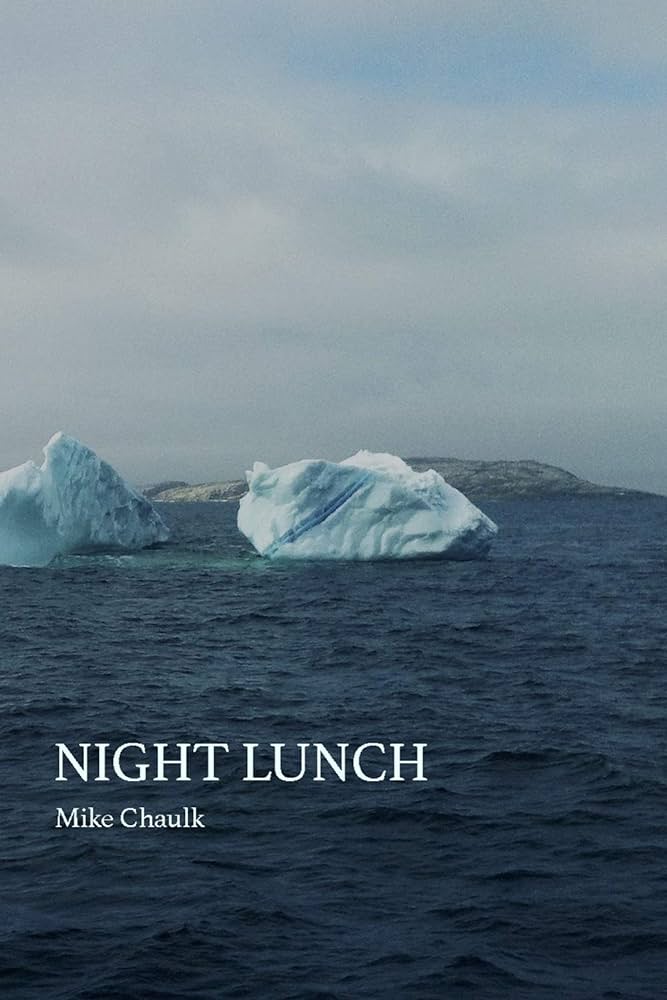
When I was young, I had a friend (who was part of the OG zine scene) who posed as a journalist and hopped on an icebreaker going up the coast of Labrador. Wild ocean, seas of ice, rugged shores, and Indigenous folks compelled to go to reserves that were not their homelands, where they had to try and live a way of life that was not their own, and where they were abandoned to poverty, hunger, pedophile priests, and all the horrors of colonialism, it’s no surprise that my friend came back from the trip fundamentally changed. I was thinking about this while reading Mike Chaulk’s wonderful collection of poems written while working on a ferry boat on that coast as a part-Inuit, part-European man who grew up far away from his family’s land and who returned seeking some kind of connection or, at least, seeking for something to make sense in some way. Sense-making is a difficult thing sometimes. Sometimes we feel it in ways we cannot articulate. Sometimes we feel we are in proximity to it even if we cannot discern how we are detecting it. Sometimes it’s more of an after-effect or a lingering symptom. I like the way Chaulk explores these things.
MOVIES
1. del Toro, Guillermo, and Mark Gustafson. Pinocchio (2022).
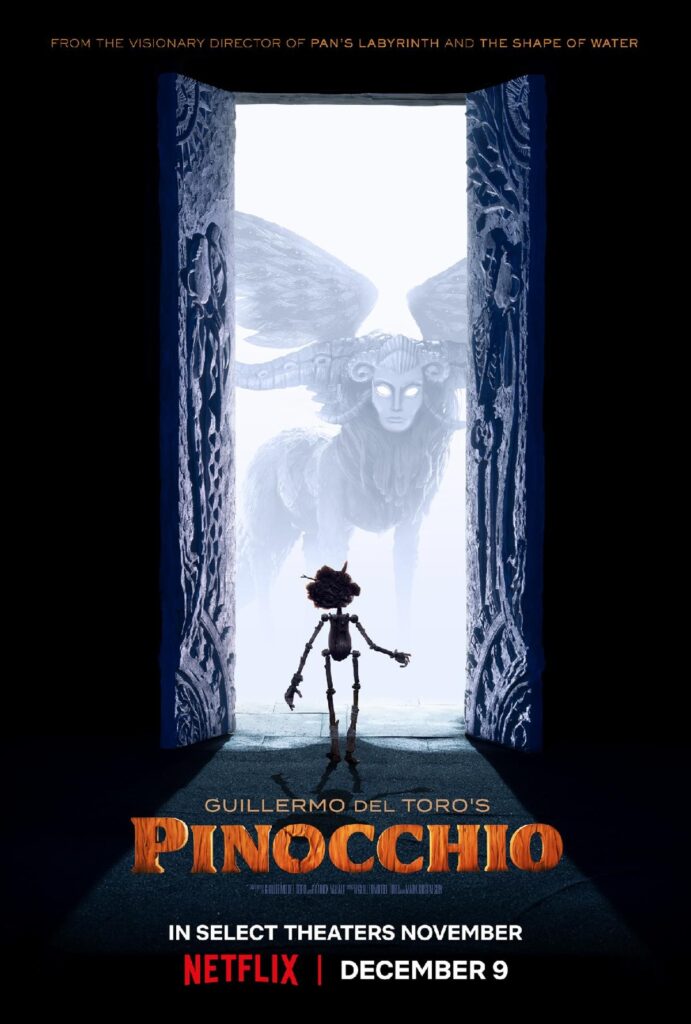
Guillermo del Toro tells amusing stories (none as great as Pan’s Labyrinth [2006] but many that are still a whole lot of fun), and stop-motion animation is an art form that I personally appreciate a lot. So, I thoroughly enjoyed “Italy during WWII” this take on the Pinocchio story (a story that, to be honest, has never really appealed to me). It’s interesting to see del Toro return to the theme of mid-twentieth century fascism (given that Pan’s Labyrinth was set in Spain during Franco’s seizure of power). Alas, such stories of fascism are more relevant now than ever before during my lifetime. Which is not to say that imperial power and neoliberal capitalism have not always been tilted in the direction of fascism (they have been). It’s just that the fascistic elements are stronger, more overt, and acting with more and more support and impunity all the time. Not just in Amerikkka but throughout much of the world as various forms of ethno-nationalism merge with neoliberal austerity in order to govern the masses on behalf of the 1%.
DOCUMENTARIES
1. Motskin, Yon. Encounters (2023).
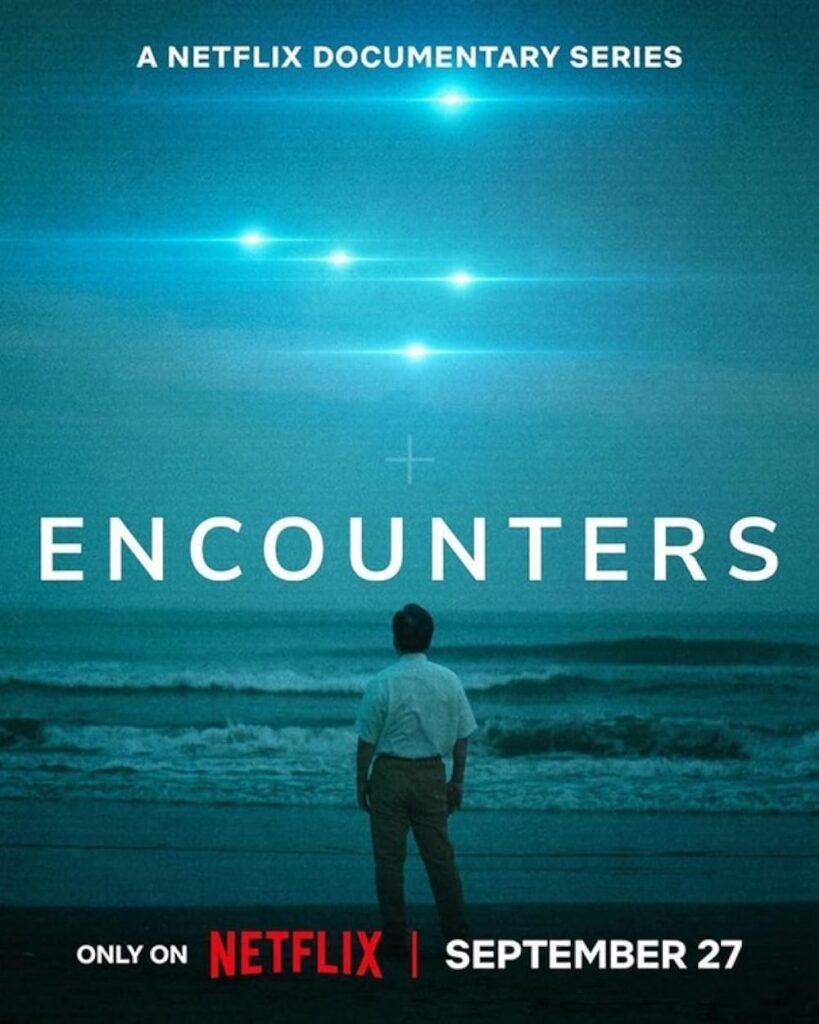
A four-part docuseries on reports of alien activity that are corroborated by large numbers of witnesses, I had a whole lot of fun watching this one. All kinds of fun hypotheses are presented (for example: some people postulate that aliens are living in their spaceships at or near the bottom of the ocean… which makes more sense than one might first think, given that the most likely places for us to find biological life in our solar system are on the oceanic moons of Saturn, Jupiter, and Neptune). Unfortunately, counter-hypotheses are largely ignored. That said, if aliens really are visiting us to tell us to beware of advances in technology because we humans might end up destroying life on earth that way, it’s a bit surprising that they would just go and say this to a few dozen school children in Zimbabwe. Curious intervention strategy for a seemingly massively more intelligent species. But, hey, who am I to judge? I, for one, support the arrival of our new cosmic overlords. But “don’t blame me—I voted for Kodos!”